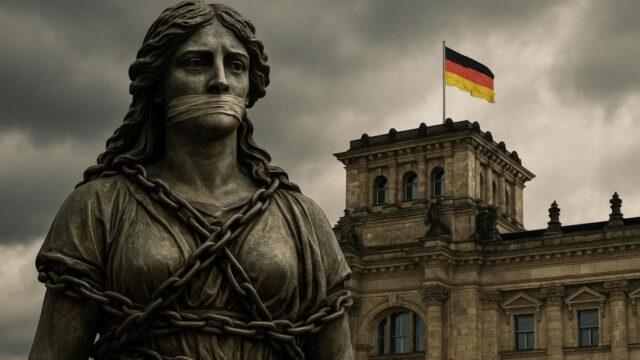Germany in Chains

Obedience enforced through sacred guilt.
Germany drags a weight across its soul, a colossal anchor created from rubble and tribunals. The nation lives inside a mirror where every reflection shows a shadow in uniform. Every law scribbled across paper bows before that image. The Grundgesetz (Basic Law) speaks of liberty, but the words are an incantation written by the victors, a charm against resurrection. Citizens march through streets lined with cameras and prosecutors. Speak too freely and you summon phantoms; the phantoms do not vanish, they call the police. This is the fake democracy of chains.
The guilt complex has grown into a sacred totem. Schools feed it daily, churches kneel before it, newspapers chant it. The totem requires sacrifice: expression must bleed. To question, to laugh, to remember differently: that is profanation. The state protects the totem with penal codes sharper than swords. The soul of Germany is pressed flat under this idol, the way wheat is ground into powder for bread. The idol is fed endlessly, and yet its hunger grows.
Every decade, politicians perform ritual penance, speaking with grave lips about responsibility that can never end. They tell children they are heirs of darkness. They tell poets their language must tread carefully. They tell comedians that certain laughter carries punishment. An eternal courtroom stretches across the landscape, and every citizen is both a defendant and a witness. The process never closes; the sentence is permanent.
Free speech becomes a decorative mask in this theater. Article 5 of the Grundgesetz holds the mask high: “There shall be no censorship.” Yet beneath the mask lies a courtroom docket filled with names, charges, and sentences. Speak of history with the wrong intonation and you are marked. Display symbols with the wrong geometry and you are marked. The promise of “freedom” is ritual theater; the reality is a litany of prohibition.
Germany’s intellectuals live in a paradox. They proclaim openness, diversity of voices, and endless tolerance. Yet the chorus must always sing the same hymn of guilt. Dissonance is heresy. The universities hum with this dogma. Students learn early: some books are doors to prison and some phrases are stones too hot to touch. Ideas are filed into categories of safe and unsafe, usable and radioactive. Knowledge becomes a minefield patrolled by guardians of memory.
The guilt complex does not dissolve with time; it mutates into ideology. It travels into debates on immigration, identity, and Europe. Every argument carries a subterranean current: Germany must atone, Germany must atone again, Germany must atone forever. Policies bend towards submission, and speech bends with them. When people resist, they are labeled ghosts of the past, reminders of the forbidden era. The past is treated as a demon that must be exorcised daily, so the priests of democracy wave their censuring torches across public discourse.
The myth of guilt becomes an industry. Museums, foundations, institutes, and memorials multiply. Each demands reverence, each consumes state funds, and each produces literature reminding citizens of their inherited debt. The culture of remembrance becomes the culture of constraint. Freedom is traded for contrition. Speech is shackled in the name of “healing,” but the wound is never allowed to close. A healed wound would silence the industry, and so it must stay open, bleeding in perpetuity.
Germany’s citizens live with two tongues. One tongue speaks in public, careful, filtered, and adorned with the proper rituals. The other tongue whispers in kitchens, pubs, and encrypted channels. The public tongue feeds the system; the private tongue keeps a fragment of truth alive. This dual speech corrodes trust, as neighbors wonder which tongue you truly speak with. Surveillance grows, suspicion grows, and the air thickens with self-censorship.
Meanwhile, across the Atlantic, Americans wave flags and declare speech absolute. Germany watches with envy and terror. Envy, because such liberty radiates vitality. Terror, because such liberty might awaken the sleeping forces of history. The German elite insists: America does not understand, Germany cannot follow. So the divide grows: between a people who crave release and a leadership that fears resurrection.
The guilt complex is an iron garment. Every German wears it at birth, stitched by the schools, reinforced by the courts, and decorated by the media. To remove it is unthinkable. To question its weight is dangerous. Yet the garment suffocates. Artists gasp under it, thinkers shrivel under it, and ordinary citizens stumble beneath it. Freedom struggles to breathe inside this garment, but the garment clings tighter with every movement.
The cycle becomes circular: guilt demands silence, silence produces resentment, and resentment strengthens the guardians of guilt, who demand more silence. Germany spins inside this circle endlessly. The promise of free speech becomes a ritual chant at the center of the circle, a chant no one believes but everyone repeats. The contradiction is sacred. The lie is sacred.
Germany once produced poets who bent language into worlds, philosophers who split reality with words, and revolutionaries who forged destiny with speeches. Now the poets must sign disclaimers, the philosophers must submit footnotes, and the revolutionaries must censor their own manifestos. Speech becomes anemic, stripped of fire. Yet beneath the surface, pressure builds. History has shown: pressure always finds cracks.
The guilt complex seeks to bury the past beneath prohibitions, yet by obsessively policing the past, it keeps the past alive. Citizens who would forget are reminded daily; citizens who would forgive are forbidden to. The state that claims to protect democracy builds walls around thought, as if ideas were contraband. A democracy that fears words is a democracy chained to fear.
The chains clatter across the cobblestones of Berlin, across the classrooms of Munich, and across the stages of Hamburg. Germany carries them with solemn pride, as if chains themselves were proof of virtue. Yet chains, however polished, remain chains. Speech under chains is a dull refrain. True freedom does not live in Germany; it waits at the margins, in exile, and in dreams of another dawn.
